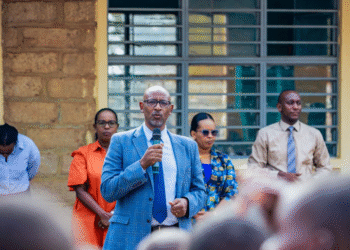Rwanda is set to become one of the first countries in Africa where residents can shop from home and receive deliveries by drone, as Zipline announced plans to roll out its next-generation service by 2026.
The U.S.-based drone company, already known in Rwanda for delivering blood and medical supplies to hospitals, says its new aircraft will carry food, medicine and online purchases directly to households in major cities.
The program will debut in Kigali, Musanze and Rubavu, areas with high demand for groceries, pharmaceuticals and e-commerce.
At the 9th Aviation Africa Summit 2025, held in Kigali last week, Zipline unveiled the Platform 2 (P2) drone, its latest model designed for home delivery.
“We are confident that in 2026 we will be able to offer Kigali residents this new home-delivery service,” said Pierre Kayitana, Zipline’s country manager in Rwanda. “We are very excited and are finalizing testing and refinements before the official launch.”
The new drone was first introduced in Dallas, Texas in April 2025, where it has been used to deliver groceries and online orders. Trials in the U.S. are now in their final stages before the system is launched in Rwanda, Kayitana said.
10 Years in the Making
The P2 drone has been under development for a decade. Each unit can carry 4 to 5 kilograms—enough food for about 8 to 10 people—and fly 20 to 25 kilometers per trip. With a top speed of 100 kilometers per hour, it could cross Kigali in about 15 minutes.
Unlike Zipline’s earlier models, which dropped packages by parachute, the new drone uses a precision tether system that lowers goods directly and safely.
“This makes it suitable for dense cities and high-rise buildings, allowing it to fly like a bird without being restricted to roads,” Kayitana said.
The P2 drone runs entirely on electricity, produces no emissions, and operates autonomously—factors that lower both environmental impact and operating costs.
Kayitana said Zipline is working with restaurants, supermarkets, and pharmacies to set pricing that will be affordable to Rwandan customers.
Legal Framework and Safety
While the company is eager to launch, Kayitana acknowledged that regulations are still being finalized.
“We are in talks with relevant authorities to ensure proper regulations,” he said. “Safety comes first.”
The drones have already been tested in Dallas, where weather conditions are more extreme than in Rwanda, to ensure they can withstand both heavy rain and strong heat.
Rwanda’s Partnership with Zipline
Zipline first partnered with Rwanda in 2016, launching its global operations from hubs in Muhanga and Kayonza to deliver blood and essential medicines to rural hospitals. President Paul Kagame has often highlighted the company as a model of innovation.
Speaking at the aviation summit earlier this month, Kagame praised Zipline’s expanded vision.
“This technology does not only save time—it saves lives,” he said.
He added that drone delivery could lay the foundation for the future of digital commerce in Rwanda and across Africa.











